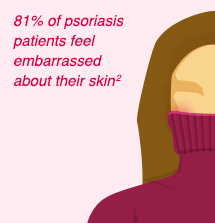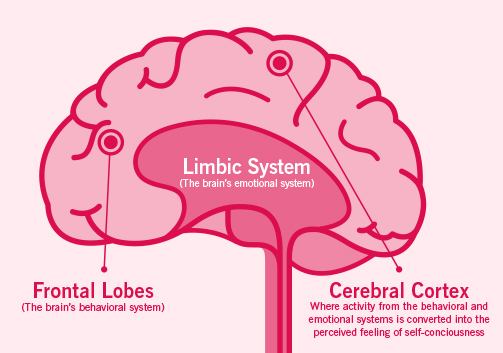The science of self-consciousness
Opaque fabrics, long sleeves and lots of make-up; these are just some of the things that people with skin conditions will try to cover their skin from onlookers.

Whether at work or out with friends, skin conditions can be a noticeable source of discomfort, causing impact far beyond that of the surface symptoms.1 Of those with chronic spontaneous urticaria (CSU), 68% say they feel less attractive than they used to, and 75% feel self-conscious and embarrassed about their skin.1Of those with psoriasis, 75% feel unattractive, while 81% feel embarrassed.2
All these worries can leave many wondering what is happening to them and why, so we went in search of some answers.
The self-conscious mind
People have studied the human mind and how it works for centuries, and although the psychology of self-consciousness is a complicated topic, it can be broadly divided into two simple principles:
- Placing too much emphasis on the opinions of others. This is public self-consciousness3
- Increased awareness of your feelings and yourself, and how your skin is affecting you. This is private self-consciousness3
These two principles can overlap. The visibility of your skin can heighten your own awareness of both your body and your thoughts (private self-consciousness), making you feel like you stand out in the crowd (public self-consciousness).
The science of self-consciousness
Opaque fabrics, long sleeves and lots of make-up; these are just some of the things that people with skin conditions will try to cover their skin from onlookers.
Whether at work or out with friends, skin conditions can be a noticeable source of discomfort, causing impact far beyond that of the surface symptoms.1 Of those with chronic spontaneous urticaria (CSU), 68% say they feel less attractive than they used to, and 75% feel self-conscious and embarrassed about their skin.1Of those with psoriasis, 75% feel unattractive, while 81% feel embarrassed.2

All these worries can leave many wondering what is happening to them and why, so we went in search of some answers.
The self-conscious mind
People have studied the human mind and how it works for centuries, and although the psychology of self-consciousness is a complicated topic, it can be broadly divided into two simple principles:
- Placing too much emphasis on the opinions of others. This is public self-consciousness3
- Increased awareness of your feelings and yourself, and how your skin is affecting you. This is private self-consciousness3
These two principles can overlap. The visibility of your skin can heighten your own awareness of both your body and your thoughts (private self-consciousness), making you feel like you stand out in the crowd (public self-consciousness).
These principles explain the cause of your concern, but what’s going on in your brain to cause them?
The self-conscious brain
As humans evolved, so too did our sense of self, developing from a basic sense of self-awareness into the current, complex concept of self-consciousness as we know it.4 Although people have been feeling self-conscious for thousands of years, scientists remain unsure about exactly what happens in the brain to produce these feelings.
Many areas of the brain are thought to play a part in the generation of self-conscious emotion, which can lead to shyness and social anxiety.5-9 However, two specific areas in the brain called the emotional system (or limbic system) and behavioral system (or frontal lobes) are thought to be the key centers of brain activity.10-11 Electrical activity generated in these two regions then moves into the outermost wrinkled structure of the brain (the cerebral cortex7) where perception occurs, and we begin to feel that familiar feeling of self-consciousness.12
“Research has identified specific nerves in the behavioral system at the front of the brain which play a part in the feeling of self-consciousness”
Research has identified specific nerves in the behavioral system at the front of the brain which play a part in self-awareness and the feeling of self-consciousness. These are 'mirror neurons' which help us understand and respond to the actions and facial expressions of those around us, and spindle neurons (also known as von Economo neurons) which are involved in the feeling of self-awareness.13,14 As these nerves can be physically activated by other peoples’ facial expressions, they could be the link between someone looking at your skin, and the self-consciousness you feel as a result.
Positive self-consciousness
While self-consciousness can really bring you down, it is not always a bad emotion; it can encourage positivity too4. By being more aware of yourself, your feelings and your actions, you are able to recognize when you are holding yourself back from social situations. It is only with this recognition that you are able to change, and enjoy a thriving social life despite your skin.
If you are having difficulties in managing the emotional or mental burden of your skin condition, talking to your doctor may aid them in providing the right advice and support for your personal needs.
As we have seen, self-consciousness is a normal emotion experienced by everyone. So remember, you are not as different as you may sometimes feel!
If you have experienced self-consciousness because of your skin and overcome these feelings, why not share your tips to inspire our online psoriasis and CSU communities?













Join one of our communities
and connect with other people with severe skin conditions
Psoriasis facebook community